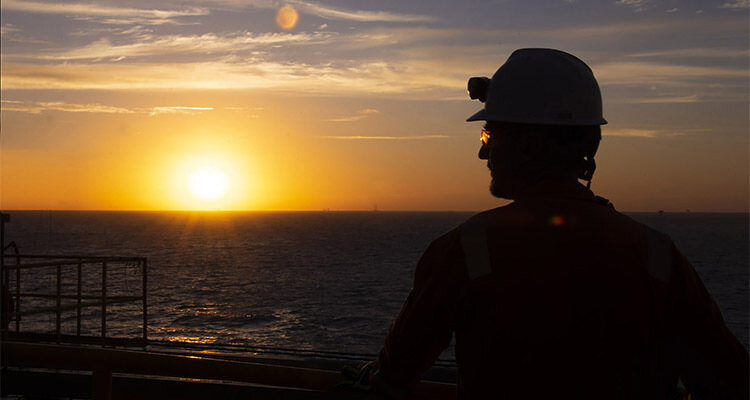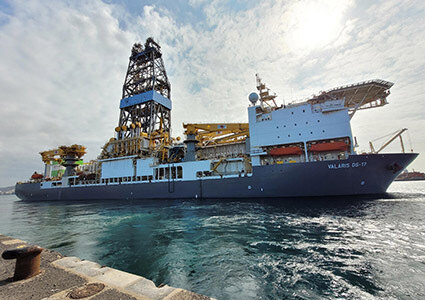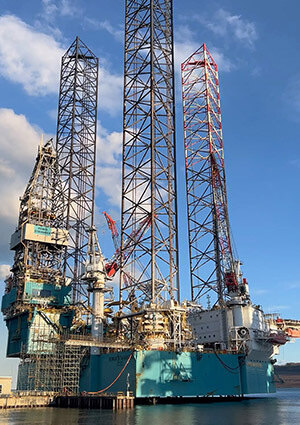
Discover how Valaris champions sustainability across its offshore drilling operations
As an industry leader in offshore drilling services, Valaris boasts the world’s largest offshore fleet, operating on six continents. With a rig fleet that stands out for its technological capabilities, Valaris has established itself as one of the most advanced players in the industry. The company’s extensive global operations include major offices in Angola, Brazil, Australia, Scotland, the UAE, and the US. With vast drilling experience across most major offshore basins, Valaris has garnered recognition for its operational and technical excellence, earning prestigious awards. Furthermore, the company has achieved the top position for total customer satisfaction in independent industry benchmarking, serving numerous prominent offshore exploration and production companies. Anton Dibowitz CEO and President, talks us through Valaris’ journey.
“Like many other offshore drillers, we initially operated as a US-centric onshore drilling company. Over our 100-year history, as technology advanced, we expanded our operations to include shallow water drilling in the Gulf of Mexico, gradually ventured into deeper offshore drilling and eventually expanded internationally. Presently, we operate on six continents and possess a fleet consisting of 11 drillships, five semisubmersibles, and 35 jackups. The significant changes to technology have had a profound impact on various aspects of our operations. They have led to notable improvements in personal and process safety management, enhanced the reliability of our rigs, and facilitated equipment data monitoring to standardize performance and enhance efficiency across our rigs. In recent years, one of the key areas in which we have evolved as a drilling contractor is the extent to which we partner with operators. We have transitioned from a traditional services model to a more collaborative, integrated services partnership with our customers. This shift has fostered a high level of integration between us and our customers, resulting in increased efficiency for both parties. Investing in our people has also been a critical element to our success. We remain committed to empowering our employees, both onshore and offshore, through various training programs, career growth opportunities, organizational health initiatives, and employee engagement initiatives. We prioritize investing in our workforce to ensure that our employees have the necessary resources and support to thrive and advance in their careers,”
he explains.
Optimizing operations
In recent years, the industry has faced many challenges such as geopolitical uncertainty impacting oil and gas supply, and cost escalation driven by inflation and disruptions in the supply chain. Anton sheds light on Valaris’ experience in navigating these obstacles. “Despite the challenges we have faced in the last few years, the demand for hydrocarbons has returned to pre-pandemic levels in 2023. The lack of investment in new sources of production in recent years, coupled with geopolitical instability and a renewed focus on energy security, has contributed to a tight supply landscape. Supportive commodity prices lead to increased spending in the upstream oil and gas sector, driving higher demand for offshore drilling services. As a result, we are expanding our operations once again after a long period of contraction. This growth is taking place within the context of an inflationary environment and stricter environmental regulations and these circumstances present both new challenges and new opportunities for offshore drillers. Our size, scale, and high-quality assets position us well to collaborate with our customers in meeting the energy needs of the future, however, we remain committed to cost management and maintaining discipline when reactivating rigs. We aim to make opportunistic upgrades to preserve the quality of our assets and in partnership with our customers to invest in technology to optimize operations and reduce the carbon footprint of its activities,” he shares.
 Global energy mix
Global energy mix
Due to increased environmental regulations to reduce greenhouse gas emissions, the demand for oil and gas has been decreased in certain sectors.
As a result, many companies are compelled to consider and incorporate sustainability practices into their operations to meet regulatory requirements. Anton discusses what that looks like for Valaris. “We have established a target to reduce emissions intensity by ten-to-20 percent by 2030, using a 2019 baseline as a reference point. To accomplish this objective, we have identified four key focus areas: implementing energy-efficient practices, conducting energy-saving upgrades, utilizing biofuels, and electrifying jack-ups. We plan to roll out these initiatives across our fleet, collaborating closely with our customers who play a vital role in providing biofuels and supporting electrification for our operations. Moreover, we are actively partnering with our customers to support their energy transition efforts. One notable example is our involvement in drilling carbon capture wells. As customers increasingly prioritize reducing their carbon footprints, this aspect of our business has the potential to grow significantly,” he elaborates.
As Anton wraps up, he shares his vision for the industry’s future. “Our industry will persist in serving customers for a very long time. Even as the world transitions towards alternative energy sources, oil and gas are anticipated to maintain their significance in the global energy mix for decades to come. Our customers will depend on us to offer responsible solutions that facilitate the delivery of this energy to consumers worldwide. This support is crucial for sustaining living standards, fostering economic growth in developing markets, and providing reliable and affordable energy options to hard-to-abate sectors such as cement, steel, petrochemical, and plastics manufacturing,” he concludes.
With its extensive experience in shaping offshore drilling, Valaris is in a favorable position to provide support to its customers amidst both current and forthcoming industry changes.